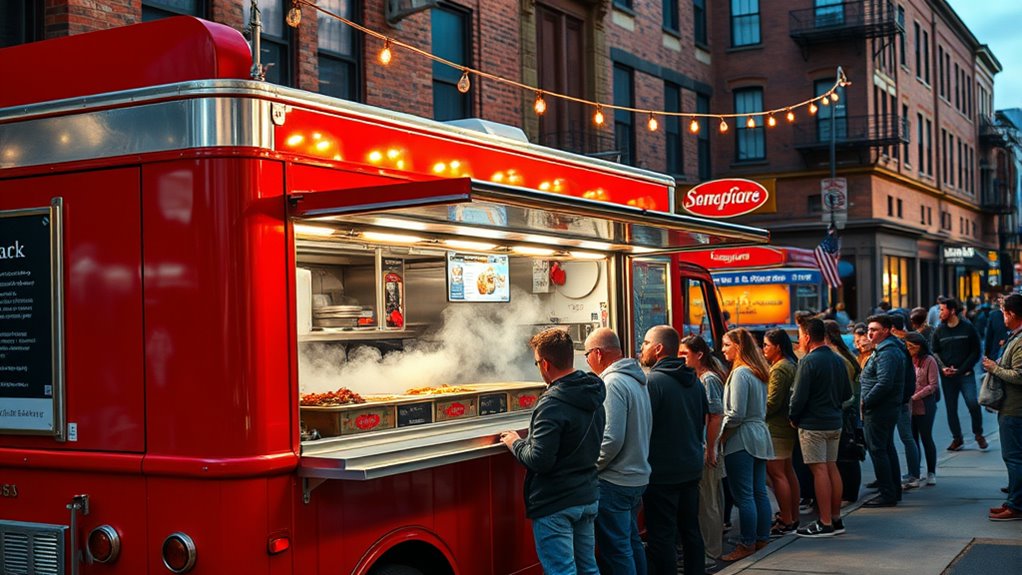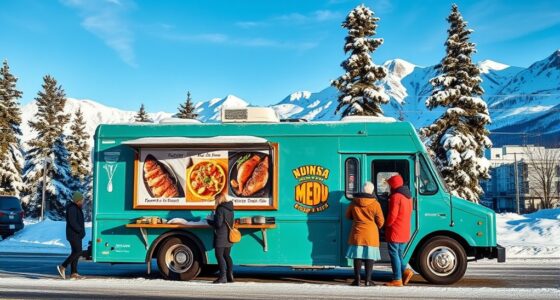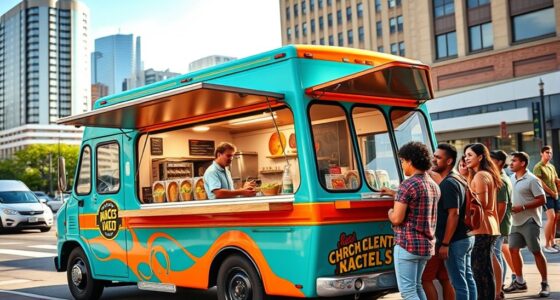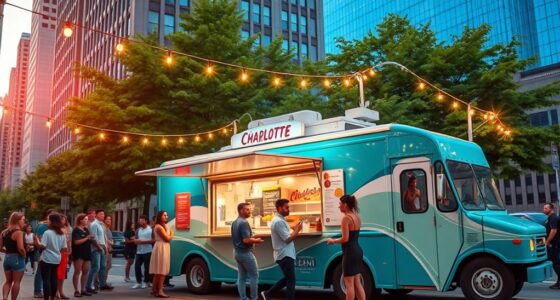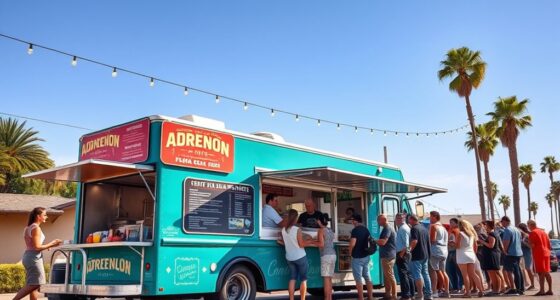To start a food truck in Newark, NJ, you need to research local permits, zoning laws, and health regulations. Choose a suitable location, secure permits, and find a compliant shared kitchen to prepare your food. Plan your budget, select equipment, and develop a menu that appeals to Newark’s diverse community. Use social media to build awareness and connect with local events. Keep learning all the essential steps to successfully launch and grow your food truck business.
Key Takeaways
- Research Newark’s zoning laws, permits, and designated food truck zones to ensure legal operation.
- Develop a strong brand and social media presence to build community awareness and attract customers.
- Secure necessary licenses, sanitation standards, and health inspections through Newark’s online portals.
- Choose and equip a compliant vehicle with essential kitchen equipment and plan your financial budget and funding options.
- Create a diverse menu tailored to Newark’s cultural tastes, set competitive prices, and implement contactless payment technology.
Starting Your Food Truck Journey

Starting your food truck journey begins with thorough research and planning. You need to understand your target audience and identify what type of cuisine will stand out in Newark’s vibrant food scene. Focus on strong food truck branding to create a memorable identity that attracts customers. Effective branding includes eye-catching logos, consistent messaging, and a clear theme. Once your brand is set, leverage social media marketing to build awareness and generate buzz before your launch. Platforms like Instagram and Facebook allow you to share your menu, location updates, and behind-the-scenes content, engaging potential customers. Combining strategic branding with active social media promotion helps establish your presence early on, making your food truck a go-to spot in Newark. Proper planning sets the foundation for long-term success. Additionally, cultivating attention during your planning and execution phases can significantly enhance your creative problem-solving and adaptability, ensuring your food truck venture remains innovative and resilient in a competitive environment.
Understanding Local Requirements

To get started, you’ll need to navigate Newark’s online permit application portals to guarantee you meet all necessary regulations. You should also familiarize yourself with sanitation standards and record-keeping requirements to stay compliant. Additionally, understanding designated food truck zones will help you choose the best locations for your business. Incorporating site navigation best practices can also streamline your process and improve your overall experience.
Online Permit Application Portals
Finding your way through the online permit application portals for Newark, NJ, is a crucial step in launching your food truck. These portals streamline the process, allowing you to submit necessary documents and track your application status efficiently. While navigating, keep in mind that strong food truck branding can help set you apart once you’re operational. Many portals also offer resources or links to local regulations, so you can guarantee compliance. Additionally, once approved, leveraging social media marketing becomes easier, as you can announce your opening and share updates directly from your online account. Staying organized and proactive during this stage ensures a smoother approval process, so focus on completing each step carefully and promptly. This foundation helps you start strong in Newark’s vibrant food scene.
Sanitation Standards and Record-Keeping
Understanding Newark’s sanitation standards and record-keeping requirements is vital for keeping your food truck compliant and operating smoothly. You must follow local food safety regulations that specify proper cleaning procedures, waste disposal, and equipment sanitation to prevent contamination. Maintaining accurate records, such as temperature logs, cleaning schedules, and inspection reports, is indispensable for demonstrating compliance during inspections. Regular record maintenance helps you identify potential issues before they escalate and ensures you meet all health department standards. Staying organized with your sanitation documentation not only keeps your food truck in line with Newark’s requirements but also promotes a safe environment for your customers. Prioritize cleanliness and meticulous record-keeping to build trust and avoid costly violations.
Designated Food Truck Zones
Are you aware of Newark’s specific designated food truck zones? Knowing where you’re allowed to operate is essential for compliant street vending. Newark has established particular zones where food trucks can park and serve customers, helping to manage street congestion and ensure safety. These zones are often regulated by parking regulations, which specify the exact locations and times you can vend. You’ll need to familiarize yourself with local signage and ordinances to avoid fines or penalties. Some zones may require permits or approval from city officials. It’s important to plan your routes around these designated areas to maximize your sales while staying within legal boundaries. Understanding Newark’s designated food truck zones keeps your street vending operations smooth and compliant.
Setting Up Your Base of Operations
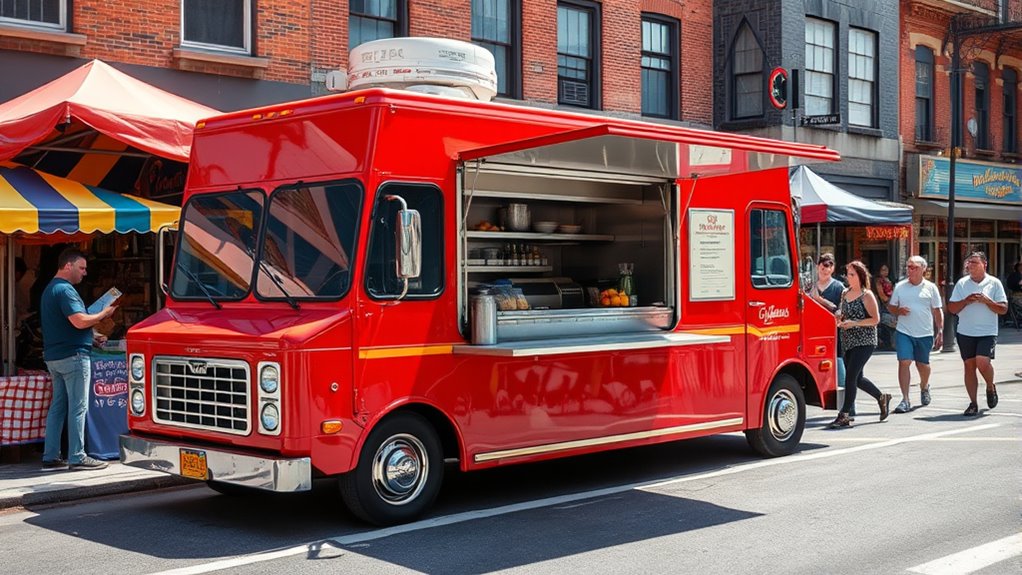
To establish your foundation of operations, you’ll need to choose a shared kitchen that meets licensing requirements. Selecting the right custom kitchen equipment guarantees your space is efficient and compliant. These steps are vital for a smooth start to your Newark food truck journey. Incorporating kitchen textiles and accessories can add both charm and practicality to your setup.
Shared Kitchen Licensing Requirements
Setting up your food truck in Newark requires securing the appropriate licensing for your shared kitchen space. Shared kitchens must meet specific licensing regulations to operate legally. First, you’ll need to obtain a food service license from the Newark health department, which ensures your kitchen complies with sanitation and safety standards. The licensing process involves inspections, documentation of food safety protocols, and proof of proper equipment. Additionally, shared kitchen operators often need to register as a food business and adhere to local zoning laws. Make sure to maintain detailed records of your inspections and certifications, as these are critical for renewing your license and avoiding penalties. Understanding and following these licensing regulations helps you establish a compliant, professional base of operations for your food truck venture.
Custom Kitchen Equipment Selection
Choosing the right kitchen equipment is essential for creating an efficient and compliant workspace for your food truck. Selecting custom appliances tailored to your menu guarantees smooth operations and meets local health regulations. Focus on versatile kitchen equipment that maximizes limited space and improves workflow. Consider customized cooking surfaces, refrigeration units, and prep stations designed for your specific needs. Properly chosen equipment not only enhances efficiency but also reduces maintenance costs and energy usage. Investing in quality custom appliances can increase your truck’s durability and performance. Remember to prioritize essential items that align with your menu and operational style.
- Custom fryers and griddles
- Compact refrigeration units
- Multi-purpose prep stations
- Specialized cooking surfaces
- Efficient exhaust and ventilation systems
Budgeting and Financing Your Food Truck
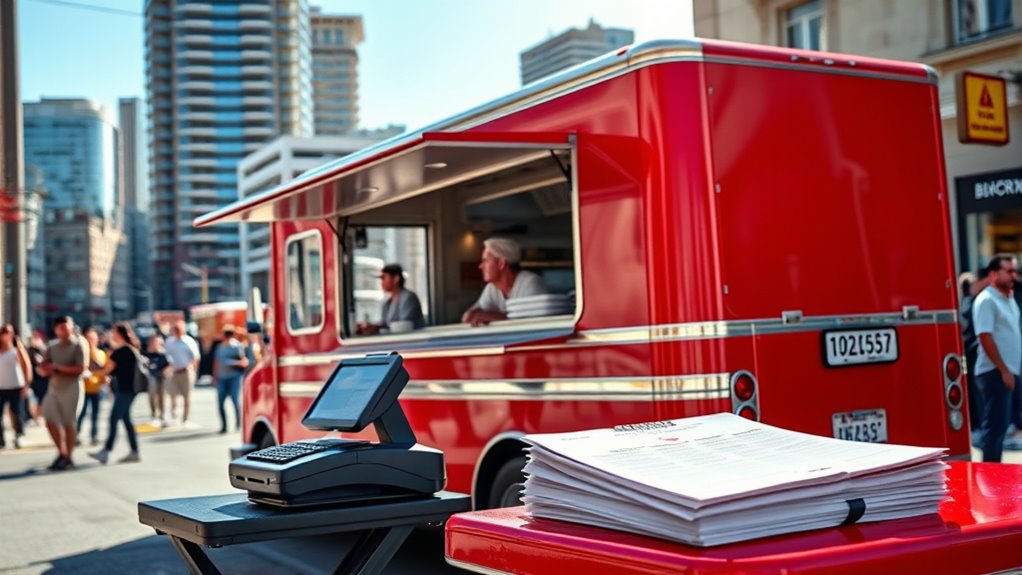
To get your food truck rolling, you’ll need to consider the costs of vehicle modifications and how to fund them. Small Business Administration loans can provide essential capital, but you’ll also want to budget for liability coverage to protect your business. Planning ahead ensures you have the finances in place to launch and grow successfully. Additionally, understanding the initial setup costs involved in outfitting your truck can help you prepare a comprehensive budget for your venture.
Initial Vehicle Modification Costs
Transforming a standard vehicle into a fully equipped food truck involves significant initial modification costs, which you’ll need to budget carefully. These costs include essential upgrades and branding to make your truck functional and attractive. You’ll likely spend on vehicle branding to create an eye-catching exterior that draws customers. Engine upgrades might be necessary to handle the added weight and frequent stops. Additionally, you’ll need to invest in kitchen equipment, custom shelving, and electrical systems. Don’t forget safety features, plumbing, and ventilation systems. Proper planning ensures you don’t overspend and helps you allocate funds effectively. By understanding these costs upfront, you’ll be better prepared to start your food truck venture in Newark, NJ, confidently managing your initial investment for long-term success.
- Vehicle branding and graphics
- Engine upgrades for performance
- Kitchen equipment installation
- Electrical and plumbing systems
- Safety and ventilation features
Small Business Administration Loans
Securing funding is a key step in turning your food truck vision into reality, especially after accounting for vehicle modifications and equipment costs. Small Business Administration (SBA) loans can provide the financial support needed to cover expenses like food safety compliance and supplier sourcing. These loans often have favorable terms, making them a smart choice for startup costs. To increase your chances, prepare a solid business plan highlighting your food safety protocols and supplier sourcing strategies. Explore options such as 7(a) loans or Microloans, which are tailored for small businesses. Here’s a quick overview:
| Loan Type | Benefits |
|---|---|
| 7(a) Loan | Flexible, larger amounts |
| Microloan | Smaller, easier approval |
| CDC/504 Loan | Equipment and real estate |
Liability Coverage for Food Trucks
Budgeting for liability coverage is a crucial step in financing your food truck because it helps protect your business from unexpected legal costs and claims. Adequate food truck insurance, including liability coverage, shields you from accidents, injuries, and property damage. Without proper coverage, a single incident could threaten your finances and reputation. When budgeting, consider the following:
- The cost of general liability coverage
- Coverage limits suitable for your operations
- Additional protection like product liability
- Premiums based on your food truck’s size and location
- The importance of comparing insurance providers
Designing Your Menu and Pricing Strategy
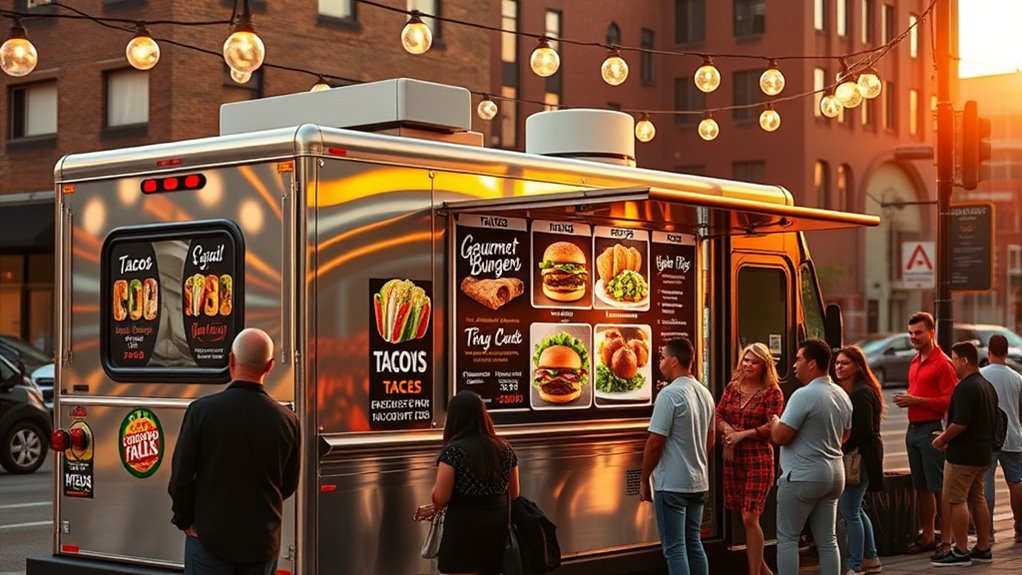
When designing your menu, focus on appealing to Newark’s diverse tastes while keeping costs in check. Break down each item’s expenses to guarantee your prices reflect customer value and profitability. Balancing variety and affordability will set your food truck apart and attract a steady stream of hungry customers. Additionally, understanding market volatility can help you anticipate fluctuations in ingredient costs and adjust your pricing strategy accordingly.
Crafting a Menu for Diverse Palates
Designing a menu that appeals to Newark’s diverse population requires careful consideration of flavors, dietary preferences, and price points. You want to create dishes that reflect various cultural tastes while maintaining attractive food presentation. Focus on ingredient sourcing to assure freshness and quality, which enhances both flavor and presentation. Incorporate options for different diets, such as vegetarian, vegan, and gluten-free choices, to broaden your reach. Pricing should be competitive yet profitable, balancing affordability with quality. To engage customers, consider these tips:
- Use colorful, appealing food presentation techniques
- Source ingredients locally for freshness and authenticity
- Offer combo meals to increase value
- Include signature dishes representing diverse cuisines
- Adjust menu items based on customer feedback and trends
Cost Breakdown and Customer Value
Creating a menu that attracts a wide range of customers hinges on understanding your costs and setting prices that deliver value. Start by breaking down expenses like ingredients, labor, and overhead to determine your minimum profitable price. Balance quality and affordability to foster customer loyalty, encouraging repeat visits. Your food truck branding plays a crucial role in shaping perceptions; a clear, appealing menu helps communicate your value proposition. When pricing, consider competitive rates in Newark and what customers perceive as fair. Offering combo deals or specials can boost sales while maintaining profit margins. By aligning your menu design and pricing strategy with your cost structure, you ensure sustainability and build trust with your audience, ultimately turning first-time customers into loyal fans.
Technology and Operations
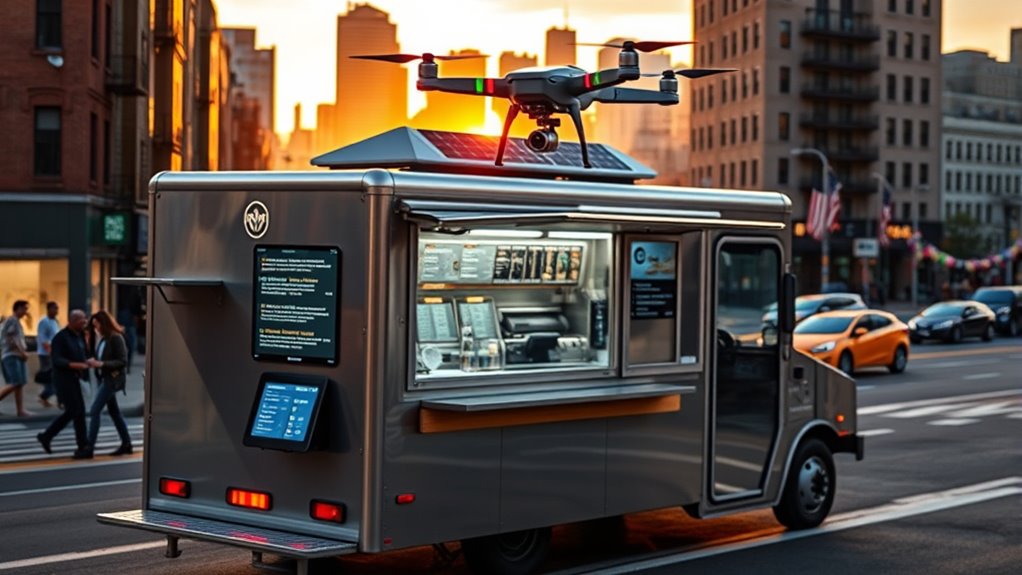
Choosing the right wireless card reader can facilitate your sales and reduce wait times. Integrating a mobile POS system ensures smooth transactions and keeps your operations flexible. Consider your options carefully to keep your food truck running seamlessly in Newark’s busy environment.
Wireless Card Reader Options
Wireless card readers have become essential for food trucks looking to streamline payments and enhance customer experience. They enable quick, secure transactions, making it easier to accept cashless payments and contactless transactions. When choosing a wireless card reader, consider factors like compatibility with your POS system, transaction speed, and security features. Some popular options include:
- Square Reader for magstripe and contactless payments
- Clover Go for versatile mobile processing
- SumUp Air for affordable contactless payments
- PayPal Here for seamless integration
- SumUp Plus for robust security features
These devices help you reduce wait times, improve efficiency, and cater to customers preferring contactless options. Investing in the right wireless card reader guarantees smooth operations and modernizes your food truck’s payment process.
Mobile POS System Integration
Integrating a mobile POS system into your food truck’s operations can substantially boost efficiency and streamline sales. With a reliable system, you can better manage cash flow, ensuring quick transactions and accurate records. This helps you keep track of sales, inventory, and expenses in real-time, making financial management smoother. Additionally, a seamless POS setup improves vendor relationships by enabling faster payments and order processing. You can also easily generate sales reports to identify top-selling items and optimize your menu. The right system reduces errors and delays, allowing you to focus more on customer service. Overall, mobile POS integration enhances operational flow, improves cash flow management, and strengthens partnerships with vendors, making your food truck more profitable and professional.
Marketing and Growing Your Presence

To grow your food truck’s presence, it’s essential to schedule your appearances at popular local events and festivals. Engaging with community events helps you connect with new customers and build loyalty. By actively participating, you’ll boost your visibility and turn attendees into regular patrons.
Popular Event Scheduling Tips
Scheduling your events strategically is essential for building a strong presence in Newark’s bustling food scene. Knowing when to showcase your food truck can make all the difference. Focus on event scheduling during peak hours when foot traffic is highest. This guarantees maximum exposure and sales. To optimize your schedule, consider these tips:
- Research local events and festivals in Newark
- Plan for weekend and lunchtime crowds
- Avoid competing with major food truck rallies
- Use weather forecasts to pick ideal days
- Rotate locations to reach diverse neighborhoods
Engaging Local Community Events
Connecting with your local community through events is one of the most effective ways to build your food truck’s presence in Newark. By participating in local festivals, farmers’ markets, and street fairs, you tap into Newark’s vibrant local food culture. These events allow you to showcase your menu and connect directly with potential customers. Establishing community partnerships with local organizations or charities can also boost your visibility and goodwill. Collaborate with other vendors or sponsors to create a memorable experience, encouraging attendees to seek out your truck again. Engaging actively in community events helps you build trust, loyalty, and a strong reputation as a supporter of Newark’s culture. This approach not only grows your customer base but also embeds your food truck into the fabric of the community.
Navigating Newark’s Food Truck Scene

Exploring Newark’s food truck scene requires understanding the city’s vibrant mix of neighborhoods, regulations, and customer preferences. To succeed, focus on strong food truck branding that appeals locally, and leverage social media advertising to reach your target audience. Newark’s rules vary by district, so research permits and parking restrictions carefully. Connecting with popular spots and events will boost visibility, but always stay flexible to adapt to crowd trends. Consider the following:
- Build a memorable brand identity
- Use social media to announce locations and specials
- Know neighborhood-specific regulations
- Attend local festivals and markets
- Engage with customers for feedback
Mastering these elements helps you navigate Newark’s food truck scene confidently and stand out among competitors.
Frequently Asked Questions
What Permits Are Required Specifically for Newark’s Food Trucks?
You need to obtain a food truck license and follow Newark regulations to operate legally. First, apply for a mobile food vendor license from the Newark Department of Health and Community Wellness. You’ll also need a food handler’s permit, a business license, and vehicle permits. Make sure your truck passes an inspection for health and safety standards. Staying compliant with Newark’s specific food truck licensing requirements guarantees a smooth start.
How Do Newark’s Local Events Impact Food Truck Operating Hours?
Think of Newark’s local events as bustling city festivals that turn your food truck into a star performer. You’ll want to align your event scheduling with these happenings, which often extend hours and attract crowds. Collaborating with vendors at these events can boost your visibility. To make the most, stay flexible, adapt your hours, and plan ahead, ensuring you’re ready to serve hungry crowds when they arrive.
Are There Any Newark-Specific Health Regulations for Mobile Food Vendors?
Yes, Newark has specific health regulations for mobile food vendors. You need to pass local health inspections to guarantee your truck meets food safety regulations. Newark’s health department requires regular inspections, proper food handling, and sanitation practices. Staying compliant helps avoid fines and shutdowns. Keep updated on any new rules by checking with the Newark Department of Health and Community Wellness to ensure your food truck operates smoothly and legally.
What Are the Common Challenges Faced by Food Trucks in Newark?
Like David facing Goliath, you’ll encounter fierce Food truck competition in Newark. To succeed, focus on customer retention by offering unique flavors and exceptional service that set you apart. Balancing permits, parking, and daily logistics can be tough, but staying flexible and building a loyal following will help you overcome these challenges. Keep your passion alive, and you’ll carve out your space in Newark’s vibrant food scene.
How Can I Connect With Newark’s Food Truck Community for Support?
You can connect with Newark’s food truck community by attending local meetups and networking events, which are great for building relationships and sharing advice. Additionally, follow and engage with food truck groups and pages on social media platforms like Facebook and Instagram. These online communities often post updates, collaborate on events, and offer support, making it easier for you to stay connected and grow your business within Newark’s vibrant food scene.
Conclusion
Starting a food truck in Newark is an exciting venture—over 1,200 food trucks operate across New Jersey, fueling a vibrant scene. With the right planning, you’ll join a dynamic community and serve up unique flavors. Remember, understanding local rules and connecting with your audience are key. So, gear up, stay adaptable, and watch your food truck thrive in Newark’s bustling food culture. Your culinary journey begins now—are you ready to roll?
